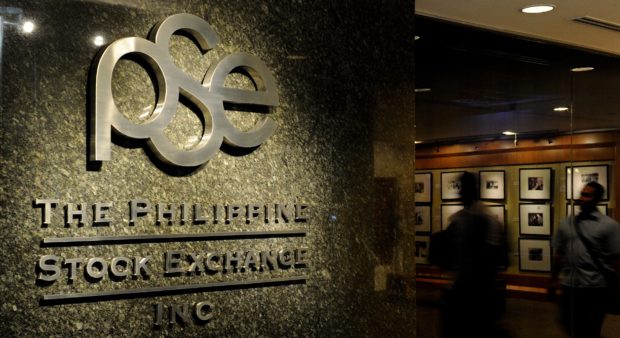Time to sift through the rubble

A trader walks in front of the logo of the Philippine Stock Exchange (File photo by JAY DIRECTO / Agence France-Presse)
MANILA — The first semester of 2023 was an exercise in patience for many stock market investors.
Sagging volumes and persistent concerns about elevated inflation kept the Philippine Stock Exchange index (PSEi) from decisively breaking out past the 7,000 level.
The banking sector was a clear outlier in terms of returns as profit margins were lifted by rising interest rates.
Large banks such as the Sy family’s BDO Unibank Inc. rallied 30 percent during the first half while Bank of the Philippine Islands gained over 6 percent. In comparison, the PSEi added just 1.5 percent during the same period.
Nonetheless, the PSEi, which gained 5 percent during the first semester versus the same period last year, was among the better-performing markets in the region.
But investors lamented the fact that the index was mostly stuck in a year-long range that mostly traded within the 6,000 level.
Consumer watch
Jonathan Ravelas, senior adviser at Reyes Tacandong & Co., told the Inquirer the PSEi’s range-bound trading was likely to continue given emerging signs that high inflation was starting to hurt consumer spending.
“The retail sector will show you if consumption, the armor of the Philippine economy, is getting hit,” he said.

Jonathan Ravelas (CONTRIBUTED PHOTO)
Large retailers such as the Gokongwei Group’s Robinsons Retail and tycoon William Belo’s Wilcon Depot Inc. reported lower profits. Lucio Co’s Puregold Price Club booked modest growth in the first half but warned that the bottomline was being affected by compressed margins due to higher costs.
The Bangko Sentral ng Pilipinas’ consumer expectations survey for the second quarter of 2023 offered more clues. The report noted that consumer sentiment remained pessimistic during the period and was “less confident for the next quarter and the next 12 months.”
The survey noted that chief concerns were the faster increase in prices and higher household expenses, lower income, few job opportunities, and the lack of confidence in policies that would generate employment, boost economic growth, and tame inflation.
Ravelas explained that inflation might be cooling but consumers remained concerned about high inflation. There was also a significant upside risk to inflation due to the El Niño phenomenon.
“The worry is the revenge spending trend may have peaked during the first quarter [of 2023] as inflation and higher interest rates begin to bite,” Ravelas said.
He said President Ferdinand Marcos Jr., during his second State of the Nation Address, had correctly outlined the need to address inflation.
But he was concerned about the government’s push for new taxes on single-use plastics apart from junk food and sweetened beverages since these would worsen price pressures and hurt the economy.
“If passed, [these taxes] could be the thing that breaks the camel’s back,” he said.
Defensive
Ravelas advised investors to take positions in defensive sectors and dividend-paying stocks.
But he noted this was a was opportune period for investors to seek out stable companies that are trading at discounted prices to prepare for the next market rebound.
This is proving to be challenging for weary investors given the frustrating drop in market activity at the PSE.
Even dealmaking activity at the bourse has taken a breather, with several large initial public offering (IPOs) being pushed back due to difficult market conditions. Among these are billionaire Enrique Razon Jr.’s P33-billion IPO for Prime Infrastructure Capital Inc. and the SM Group’s P55-billion real estate investment trust, which would have been the country’s biggest public listing on record.
Juan Paolo Colet, managing director at investment bank China Bank Capital Corp., agreed that market volumes have been dropping in the Philippines, but he noted that declines were also observed across regional peers.
“The total market value turnover of the PSE has been weaker in the first half of 2023 compared with the same period in 2022,” he told the Inquirer.
“This is not unique to the Philippines as the same trend can be seen in other Southeast Asian equity markets such as Thailand, Indonesia, Malaysia, and even Singapore,” he added.
Meager volume
Data from the PSE showed that the average daily traded value slipped 4.4 percent in the first semester of the year versus the first six months of 2022. Moreover, the daily traded value had dropped nearly 11 percent compared to the first semester of 2019.
“The weak volumes reflect the shift of foreign fund flows to more developed markets, particularly the US, as institutional investors chase the AI (artificial intelligence) rally. Most of the excitement is in the US markets,” Colet said.
Some options are on the table to partially revive market activity. The PSE and Securities and Exchange Commission are working out the final kinks to allow short-selling in the Philippines.
Short selling is the ability to sell stocks that an investor doesn’t have, by borrowing such securities and buying it back later. This is if the investor is betting that the stock price will drop, thus profiting from the differential.
Moreover, the exchange is gearing up for the formal launch of a stock market trading platform on GCash, one of the country’s biggest mobile wallets with over 80 million users.
“PSE trading volumes should eventually recover as the inflation cloud clears, interest rates start to fall, and foreign funds rotate back to high growth emerging markets,” Colet said.
“A lot of these factors are macroeconomic, but there are many things the PSE can do to improve our equity market, including the anticipated launch of short selling, offering equity derivatives, and introducing an alternative investment market similar to that of the London Stock Exchange,” he added.
